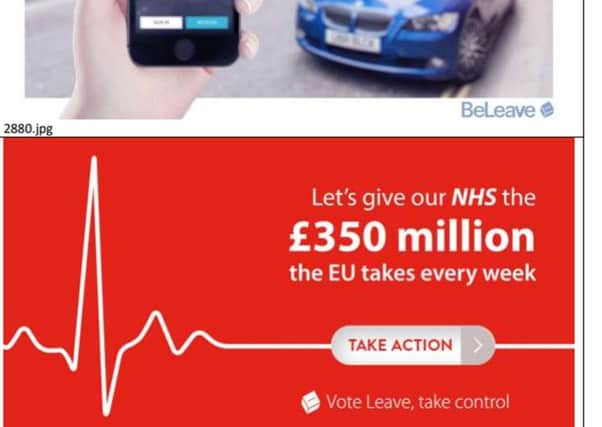Willie Sullivan: How to stop online fake news from swaying elections


We’re used to seeing ‘imprints’ on leaflets – that bit of spiel saying who the literature is being promoted by. So why don’t we have that online?
This week we saw a step forward when it comes to transparency in online campaigning. Facebook released the ads of Vote Leave which were run by Aggregate IQ, following a demand from Parliament’s Digital, Culture, Media and Sport Committee.
Advertisement
Hide AdAdvertisement
Hide AdThey are investigating the issue of fake news in British elections – and honing in on wrongdoing in the EU referendum.
But this release of ads shouldn’t be an exception. Nor should it be one-sided.
It’s time to shine a light on ‘dark ads’ online. We need to know: what are campaigns saying to others that they aren’t saying to us? Are we getting the whole picture?
‘Micro-targeting’ online campaign ads isn’t completely new, or confined to one side. But the regulations simply aren’t there to keep track and keep voters informed.
Instead, we risk a million secret campaigns each election – undermining the ability to have a truly national conversation.
Here’s what needs to happen to start with: all Facebook adverts commissioned by the official referendum campaigns should be released publicly.
And online adverts should have ‘imprints’ in the same way as printed materials state who has funded them.
While it’s right that all voters can now see some of the ads run during the EU referendum – this should be the standard for elections and referendums, and not just on one side. This is about transparency and a level playing field when it comes to crucial political decisions.
Advertisement
Hide AdAdvertisement
Hide AdAt the moment, so-called dark ads pose undermine the chances of a balanced, UK-wide election campaign – with thousands of potentially contradictory or misleading messages going out to small groups of voters.
Extending the imprint requirements for physical leaflets and letters to electronic material is a simple, practical change ministers could make now.
And as an immediate step to achieving greater transparency, all digital adverts paid for by the official Brexit campaigns should now be released.
Until the law changes, we need a pause in online political ads to ensure voters can have full confidence in our elections.
This should be the first step before updating Britain’s outdated campaign regulations. The online political sphere is a Wild West at the moment: let’s fix that.
Willie Sullivan is the Electoral Reform Society’s Scotland director
